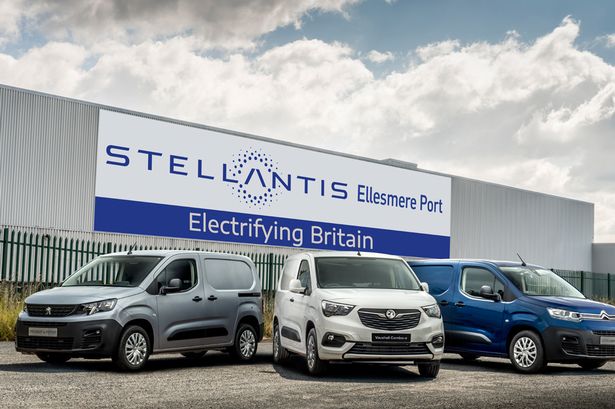The huge Vauxhall plant at Ellesmere Port could be closed if the government does not change its Brexit deal, its owner has warned.
Parent company Stellantis, whose brands also include Citroen, Peugeot and Fiat, said it would be unable to keep its commitment to make electric vehicles in the UK without changes to the deal.
The group, which employs more than 5,000 people in the UK, told a Commons inquiry into supply of batteries for EV manufacture that their UK investments were in the balance due to the terms of the trade deal.
READ MORE: Click here to sign up to the BusinessLive North West newsletter
The world’s fourth biggest car maker committed to making electric vehicles at its Ellesmere Port plant two years ago.
Stellantis confirmed a £100m investment into the plant in July 2021, securing hundreds of jobs at the huge site.
Around 800 people are directly employed by the Vauxhall plant, known for manufacturing the Astra model.
But in a submission to the inquiry, the company said the Brexit deal was a "threat to our export business and the sustainability of our UK manufacturing operations".
It called on the government to reach agreement with the EU to maintain existing rules until 2027, rather than next year's planned changes which state 45% of an electric car's value should originate in the UK or EU to qualify for trade without tariffs.
Stellantis said the rise in the cost of raw materials during the pandemic and energy crisis meant it was "unable to meet these rules of origin".
It said the upcoming rules would see 10% tariffs on trade with the EU and make domestic production and exports uncompetitive with Japan and South Korea.
The company said that would mean manufacturers "will not continue to invest" and will relocate.
"To reinforce the sustainability of our manufacturing plants in the UK, the UK must consider its trading arrangements with Europe," Stellantis told the inquiry, listing Honda’s closing of its site in Swindon and investment in the US as examples of its impact.
Stellantis said there will be "insufficient battery production" in the UK or Europe to meet government targets in phasing out petrol and diesel vehicles by 2025 and 2030.
"It we are unable to rely on sufficient UK or European batteries, we will be at a major competitive disadvantage. In particular against Asian imports," they said.
"We need to reinforce the competitiveness of the UK by establishing battery production in the UK."
Electric cars and batteries were among the final parts of the Brexit deal agreed between then Prime Minister Boris Johnson and President of the European Commission Ursula von der Leyen in 2020.
READ MORE:
Jaguar Land Rover extends Ellesmere Port stay after £2.6m-a-year deal
30 James Street sold as new owner promises 'significant investment'
Liverpool's Royal Albert Dock sold for £40m as new restaurants and bars promised
Hope Street Hotel opens second luxury destination at Liverpool ONE
Preferred buyer identified for four-star Merseyside hotel

